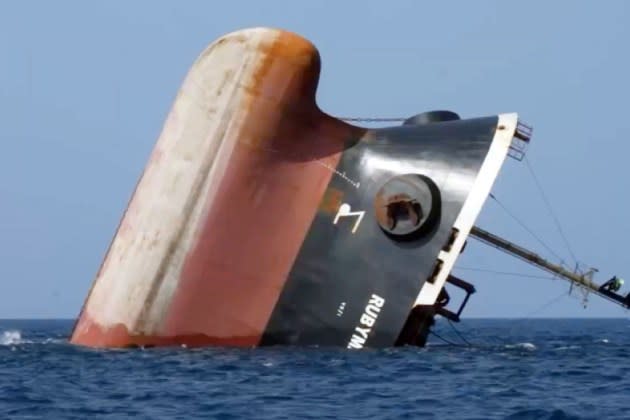Geopolitical Tensions Involving Red Sea, China Will Get Resolved According to Retired Admiral
- Oops!Something went wrong.Please try again later.

No need to worry.
Despite uncertainties from the Red Sea disruptions to geopolitical concerns such as U.S.-China trade relations, as well as the U.S. presidential election later this year, things will work out—eventually.
More from Sourcing Journal
Unexplained Modems Raise Red Flags in Probe of China-Built Cranes at US Ports
Congress, Industry Leaders Launch Coalition to Close the De Minimis Loophole
That was the conclusion of Admiral Jonathan Greenert (U.S. Navy-Ret.), who is on the President’s Advisory Council. He provided some viewpoints on current geopolitical concerns at the UBS Global Consumer and Retail Conference on Tuesday at the Lotte New York Place in Manhattan.
Greenert said there will be some resolution of the Red Sea disruptions that are occurring, but maybe not until after the presidential election. He said the U.S. military has bases around the world to protect America and its current treaty requirements, as well as support the global economy. The U.S. has a “lot of partners willing to help,” but that the concern is not wanting the crisis to spread, he explained. Moreover, given that 2024 is an election year, no one wants to give anyone a reason to say that Biden’s “got us into another war.” Depending on what Yemen’s Houthis do and whether capacity gets reduced further, there could be some more muddling on for a bit, but probably not much longer after the presidential election is over, he concluded.
Greenert said the situation with the Axis of Resistance—China, Russia, Iran and North Korea—is not that different today from the political hostility we had during the Cold War. He said the U.S. still has the advantage, and it would be up to the U.S. take control of the situation. But he also noted that the U.S. can’t be “wringing its hands” and not be clear about leadership, because that will provide “more opportunity for this to fester.”
He expects there will be an “armistice” at some point to resolve the conflict between Russia and Ukraine, adding that there doesn’t need to be a direct confrontation with NATO “unless it is deliberate. We won’t stumble into this.”
As for U.S. trade relations with China, Greenert said the biggest risk is one of miscommunication and miscalculation. While each side is committed to its rhetorical positions, the respective militaries have been in talks and civilian leaders are starting to build on areas where there can be cooperation, he said. As for a China invasion of Taiwan, the admiral said Xi Jinping, president of the People’s Republic of China, has “problems internally” and that he really has “one chance at an invasion. If he blows it, what is his legacy? He’s done so much but if it goes wrong, what does that mean? That’s a big concern.”
Not surprisingly, future trade policy in the U.S. will depend on the outcome of the presidential election this year. But Greenert said he’s “not tremendously worried. Both candidates have a similar take on China.” As for former President Donald Trump’s blustering sound bites and threats over leaving NATO (North Atlantic Treaty Organization), the admiral said a “law” would be needed to allow that to occur since the president can’t unilaterally decide to withdraw, not mention that leaving NATO would be a “very controversial” move.
UBS chief U.S. economist Jonathan Pingle also spoke at the conference. Between current U.S. President Joe Biden and Trump as the respective Democrat and Republican party nominees, Pingle said one big concern centers on their different views on tax policy. With the 2017 tax provision set to expire, that would result in a $2.8 trillion tax increase. “It’s difficult to imagine that either the Democrats or the Republicans would let the increase go in its current form,” the economist said.
The expectation, although not entirely clear in the current budget, is that the Biden administration would likely extend tax cuts for those whose incomes are under $400,000 or $450,000 a year, while also raising corporate taxes and taxes on capital gains. If Trump wins re-election, Pingle said the odds are that the tax cuts are extended. He also expects the possibility of a claw back on green investments and a shift in outlook for GDP.
Pringle also said that the focus now is on the election outcome but that two months after the election when the new administration is in place, its first order of business will be addressing the debt ceiling. Looming over the horizon will be what to do about tax hikes.
Pingle also said his firm is “bearish on consumer spending,” given the amount of stress among American consumers in the bottom income level tiers.

